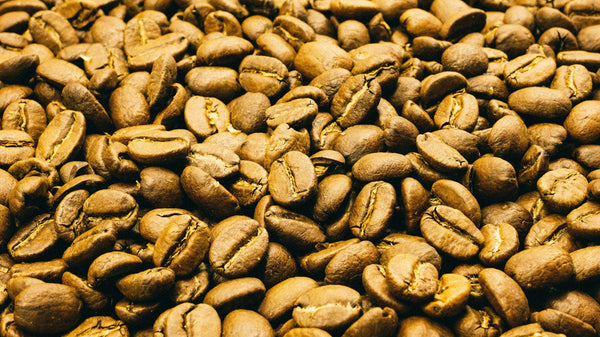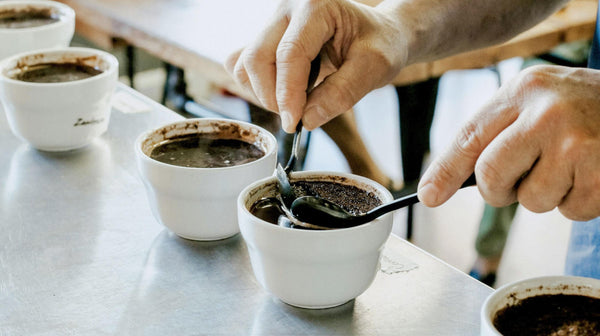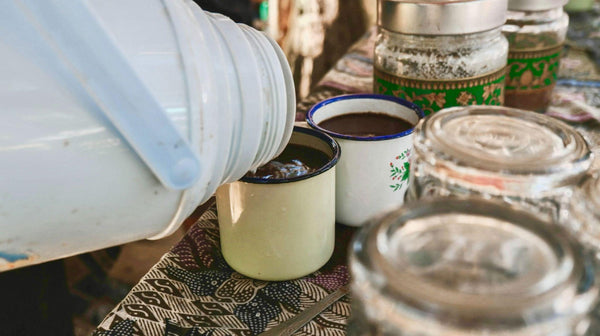On The Trail: Nilo Coffee Plantation

Harvest season has finally arrived, a nerve-wracking but exciting time for coffee farmers. Those vibrant red "cherries," as they call the ripe coffee fruits, are highly perishable. A year's worth of hard work comes down to this single harvest, making it a true make-or-break moment. For Nilo Coffee Farm, nestled within Pondok Wisata Kenarikun, each cherry holds immense significance. This year marks their very first harvest, a culmination of tradition, hope, and possibility.
Flores Island Coffee had the incredible opportunity to experience the harvest firsthand. Located on Desa Wuliwutik, about 7.1 km from Maumere, it took us 30 minutes to get there by car. We went up the winding road, passing through the forest of bamboo and cashew trees, up into the green hill where we could see the infamous attraction for pilgrims, the Mother of All Nations statue, looking over the city gracefully from a distance.
When we arrived, damp air washed over us, a refreshing contrast to the morning heat. The recent rain hung in the air, carrying the earthy scent of fresh soil and a hint of ripe coffee cherries. What met our eyes next was yet again a breathtaking green landscape, surrounded by warm smiles—a mingling of fellow guests and the farmers themselves.
Compact coffee trees, varying from hip-height to taller ones reaching overhead, stretch out under a protective canopy of mahogany giants. The shade trees are vital to the well-being of the coffee plant. Unlike their sun-grown counterparts, shade-grown coffee thrives in a cooler, more protected environment. The harsh midday sun can scorch the delicate coffee leaves, hindering bean development, and leading to bitter flavors. The mahogany canopy filters out intense sunlight and creates a dappled light effect that mimics the coffee plant's native habitat—the understory of rainforests.



Photo by Flores Island Coffee
Eager to participate, we were equipped with baskets. Suitbertus Amandus, the driving force behind the farm, guided us through the meticulous process of hand-picking coffee cherries. "Unlike a mechanical harvester's indiscriminate rampage," he explained, "our task demands a more discerning touch." We learned to seek out the deep, crimson red cherries, a sign of perfect ripeness with a slight give to the touch. A gentle twist was all that was needed to remove the cherry, leaving the stem intact to ensure future harvests.
After getting enough ripe cherries, we were introduced to the next crucial step, pulping. Here, tradition takes center stage. Nilo Coffee Farm utilizes the traditional wet processing method, renowned for drawing out the best flavors in the beans. The farm employs a time-honored technique where the cherries are separated from the fruit by grinding. This process carefully removes the outer flesh to reveal the coffee bean itself.
Following pulping, the beans undergo a fermentation stage. During this step, the beans are submerged in a controlled environment, allowing natural enzymes to break down the sticky mucilage layer surrounding them. This breakdown is essential for developing the unique flavor profile of the coffee. Once the fermentation is complete, the beans are meticulously washed to remove any remaining mucilage and other residue, ensuring a clean base for the next stage. While the drying process, which prepares the beans for roasting, falls outside the scope of our visit, it is the final step in transforming these vibrant cherries into the foundation for a delicious cup of coffee.



Photo by Flores Island Coffee
This focus on quality extended beyond the harvesting techniques and processing methods. The farm is actively involved in knowledge-sharing and collaboration with the community, even providing seedlings to farmers outside of Nilo Coffee Farm. This dedication, Amandus explained, is a testament to their belief in the power of collaboration. This year's harvest holds even greater significance, with 20 national internship program students who have been working on the farm for the past month. They are joined by a representative from AEKI-AICE, Ise Fernandez, whose expertise adds another layer of guidance for ensuring this significant first harvest is a resounding success.
Traditionally, Amandus elaborated, the community subsisted on a diverse range of crops and foraged wild plants. This way of life, while connected to the land, presented limitations. Sikka's climate, with its distinct dry and wet seasons, could be unpredictable, impacting harvests and leading to periods of scarcity. The limited reach of their produce restricted economic opportunities, leaving some members of the community without a steady income. Recognizing these challenges, Amandus, together with community leaders, began exploring sustainable cash crops. With East Nusa Tenggara's strong tradition in coffee cultivation, and Wuliwutik's ideal location—a cool mountain climate at 1.000 meters above sea level, coffee emerged as a natural contender.
"We started small," Amandus shared with a touch of nostalgia, "with just 20 coffee trees, old and mostly forgotten. All were of the Arabica variety. Experts were consulted, traditional practices were reevaluated, and we slowly but surely expanded." Today, the farm boasts a thriving plantation containing 10,000 Arabica coffee trees. Their commitment to biodiversity extends beyond coffee; cacao, orange, banana, and apple trees are carefully grown throughout the farm, creating a beautiful and sustainable ecosystem. Chickens roam amongst the crops, adding to the vibrant life of the farm.
However, cultivating coffee for commercial purposes presented a different challenge. Safa, one of the enthusiastic internship students, mentioned encountering pest issues during their mapping of the farm and surrounding areas for potential expansion. "But it's clear that the farm isn't shying away from challenges," Safa affirmed. "Their proactive approach in seeking solutions demonstrates a commitment to overcoming hurdles and ensuring long-term sustainability."
This first harvest marks a significant milestone, and with continued hard work and strategic planning, Nilo Coffee Farm has enough potential to act as a pilot project for the region's economic development. This is not just about a delicious cup of coffee. It is a story of hard work, resilience, and the pursuit of a better future. The collaboration of everyone involved, from the experienced farmers to the enthusiastic interns, paints a promising picture for Nilo Coffee Farm. Ultimately, they strive for a balance between high quality, strong prices, and better livelihoods for the community. This mission aligns with the broader goals of Flores Island Coffee, who see Nilo Farm as a vital step in revitalizing the coffee culture within East Nusa Tenggara and placing Flores single-origin coffee firmly on the world map. When you choose Flores coffee, you become part of this story.




